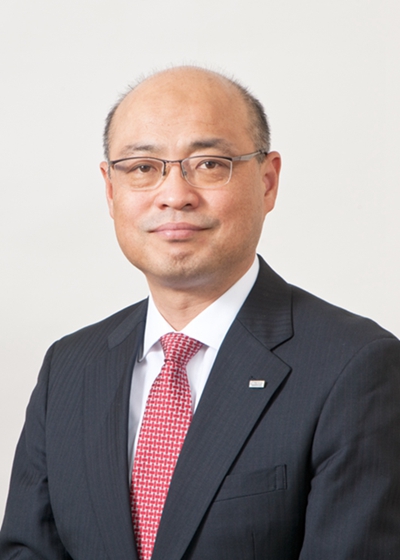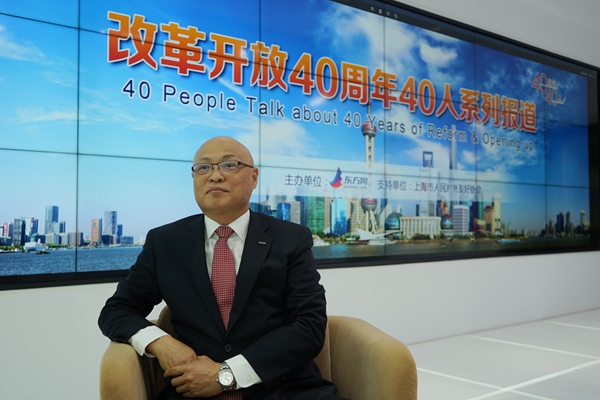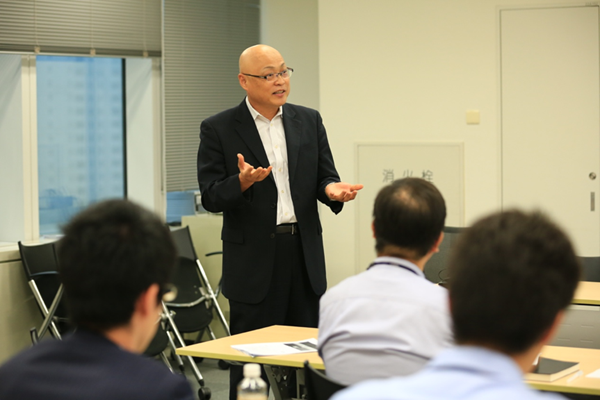Toyoki Oka is one of the recipients of the 2019 Shanghai Magnolia Award. Prior to his current position as advisor to Mizuho Bank, he worked as Chairman of Mizuho Bank China and Executive Officer of Mizuho Bank. Commenting on his winning the award, Toyoki said, “Looking back, I have worked with China for about 26 years and lived in Shanghai for 14 years.Shanghai is the most rapidly changing and stunning city for me. Working here in the banking industry is a great pleasure.”

(Toyoki Oka)
Witness to China’s financial opening up
Toyoki sat down with Eastday last year in commemoration of the 40thanniversary of China’s reform and opening up. During that interview, he talked about Mizuho Bank’s history in China and his own story over those years.

(Toyoki Oka receives an interview at Eastday in 2018)
Toyoki Oka joined the Industrial Bank of Japan (the predecessor of Mizuho Bank) in 1986, and has been working with China since 1994. Six times, he was dispatched to work in Hong Kong and the mainland. His time in Shanghai lasted 14 years in total. He is a witness to Mizuho Bank’s development in China and the reform of Shanghai’s financial industry. Now the bank has 16 outlets across China, representing a major presence among foreign-funded banks in China.
According to Toyoki, what has impressed him the most is that in 1997 the Industrial Bank of Japan became one of the 1st foreign banks in China allowed to offer an RMB business.
At that time, the business scope of foreign-invested banks in China was limited to the foreign currency business. But in the 1990s, thanks to China’s emphasis on reform and opening up, more foreign banks were allowed to access China. Upon the announcement of China’s pilot program of allowing an RMB business in foreign banks, those banks were hunkering down to get the first RMB business qualification.From 1994 to 1996, the whole bank was going all out to get the RMB business qualification, according to Toyoki, who was busy with preparation together with his colleagues every day. On the last day of 1996, the Industrial Bank of Japan was approved as the one of the first batch of foreign banks qualified to open an RMB business in China.
The next year, the Industrial Bank of Japan moved its Shanghai branch from Hongqiao to Lujiazui. “Representatives of the People’s Bank of China and the Pudong New Area government, People’s Daily, Jiefang Daily, Xinhua News Agency and other media were present at the ribbon-cutting ceremony. Those scenes still linger in my mind,” said Toyoki excitedly.
Promoting Sino-Japanese exchanges
Toyoki now has another job: General Secretary ofJCIPO (Japan-China Investment Promotion Organization). Outside the banking field, he has promotedSino-Japanese exchanges in China.
In China, he has been an active player in several organizations, including the Asian Financial Cooperation Association (AFCA), the Shanghai Japanese Commerce and Industry Club, and the JCIPO. He participated in the “Hope Project” in poverty-stricken areas to get children into school and improve their school conditions; he helped promote industrial cooperation and financial exchanges between China and other countries; and he has been a frequent attendee of the annual Lujiazui Forum hosted by Shanghai.

(Toyoki in a speech)
He pays more attention to medical care, among all the sectors. As China's aging problem becomes serious, the demand for medical care and nursing is growing. Considering that the problems which often arise from the aging population have already been experienced in Japan, Toyoki said, “Japan is constantly improving its social security system including medical and nursing insurance, developing medical technology, and promoting some measures to extend a healthy life. I think some of the experiences can be introduced to China.” In many cases, like seminars and speeches, he has introduced how Japan responds to the aging society for China to draw upon.
For example, one of the most talked about topics is cancer. In Japan, one in two may have cancer, butthrough cancer prevention, early diagnosis, and early treatment, the recovery rate is very high. Toyoki hopes to introduce the medical system of “earlyprevention, early diagnosis, and early treatment” to China, which can benefit more people.
As 2019 marks the China-Japan Youth Exchange Promotion Year, Toyoki is turning his eyes to youth exchange. By attending seminars and speeches at universities, he wants to help young people in China and Japan better understand each other’s countries and cultures.
